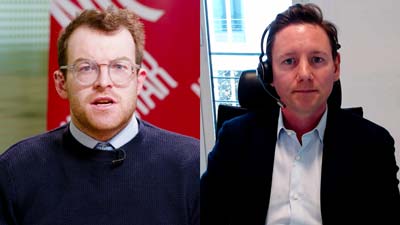 The macro-economic environment has been driving markets this year, say Salim Hart and Naveed Rahman, co-managers of the 5-star gold-rated $1.6 billion Fidelity Global Intrinsic Value Class F. While the backdrop has proven to be challenging in itself, they remain focused on a value-oriented style that carefully selects attractively-priced global small companies.
The macro-economic environment has been driving markets this year, say Salim Hart and Naveed Rahman, co-managers of the 5-star gold-rated $1.6 billion Fidelity Global Intrinsic Value Class F. While the backdrop has proven to be challenging in itself, they remain focused on a value-oriented style that carefully selects attractively-priced global small companies.
"Just this year, some of the macro activity has stabilised a little bit and markets have rebounded quite a bit. A lot of investors are hiding in the less cyclical or growth companies that are less exposed to a potential downturn in the economy,” says Hart, a Boston-based portfolio manager who joined Fidelity Investments in 2007, after earning an MBA at the MIT Sloan School of Management.
Hart and Rahman have worked on the fund since 2015, and continue to consult with former lead manager Joel Tillinghast, the legendary value investor who is retiring this year after guiding several value equity funds for many years. Other members of the team include portfolio managers Sam Chamovitz and Morgan Peck.
Year-to-date (4 August) Fidelity Global Intrinsic Value Class F has returned 8.40% versus 7.46% for the Global Small/Mid Cap Equity category. Over the longer term, the fund also outperformed as it returned an annualised 12.58% over three years and 6.92% over five years. In contrast, the category returned an annualised 6.07% and 3.19% for the corresponding periods.
Inflation and Interest Rates Still Warrant Attention
The other key factor causing uncertainty is interest rates. That’s because small caps are generally more interest rate sensitive, says portfolio manager Rahman, who joined Fidelity in 2003, after working for two years at Boston Consulting Group.
"There are fewer cash-generative, self-funding businesses than there are in the large-cap blue-chip space, so the fact that interest rates have increased in most of the world does present a difficult environment for small-caps," he says.
"Interest rates are a bigger issue for small and mid-cap companies than they are for those like Apple Inc. [APPL], which generate billions of dollars in free cash flow and can control their destinies."
Value stocks tend to benefit in an inflationary environment, says Rahman, because they can pass through the impact of inflationary forces. Stocks in the energy, materials and financials sectors are chief beneficiaries of high inflation.
"Over time, high interest rates act as a form of gravity on high-growth stocks, where the present value of future cash flows is less attractive if the discount rate is higher. Inflation has come down [in the last year]. But it’s still well above the Federal Reserve’s target of two per cent."
Rahman notes it is hard to predict where inflation will be in the medium term, but it likely won’t decline quickly – nor will it fall in a straight-forward pattern. "Our point is that high inflation may be around for a long time. That’s a better backdrop for value stocks, than the opposite when interest rates are very low, and so is inflation."
A Good Company Isn’t Always a Good Investment
As for valuations, Hart notes some stocks have become quite expensive, partly because of the make-up of the company. Pointing to the fund’s benchmark, the MSCI World Small Cap Index, Hartnotes that 37% of US companies lost money over the last 12 months.
"Outside the US, only 16% are losing money," he says.
"It depends partly on how you frame the question about valuation. While there are pockets of cheap stocks that we are finding in the US, our portfolio has tended to skew towards larger-cap in the US where there is a bigger opportunity set of high quality money-making companies. Whereas outside the US, small-caps are more profitable, valuations are better and there is a broader universe of companies which we find attractive."
Rahman points out the stocks in his portfolio are trading on average about 10 times forward price-to-earnings, versus 14 times forward earnings for the broader market.
"That’s a nearly 30% discount to the market. Those valuations are in a different zip code than large-cap US technology stocks," he says.
"Companies like Nvidia Inc. [NVDA] are trading at 40 times sales and 56 times forward price-earnings. It is arguably in a pole position with the AI revolution coming our way. But if history is any guide, we won’t know the full impact of what people are talking about for quite a while. The winners and losers are rarely what they appear at the onset of a seismic change like this.
"This company could be a fantastic player in this new AI realm. But the point is that, at 56 times forward earnings, a good company and a good investment are not always the same thing."
Where in the World is the Value Right Now?
Hart and Rahman look for companies that combine both aspects, and, moreover, are trading at a discount to their intrinsic values. This is reflected in the portfolio geographic mix. About 42.10% of the fund is held in US stocks, while 49.47% is held in international stocks. The country weights are a by-product of the stock selection process.
Significantly, there is 17.4% held in Japan, a market that has long been out of favour [our colleague James Gard recently published a two-part look at the twin issues of Japanese corporate governance and fund manager engagement].
"[Japan] is under-owned by global investors and one of the cheapest developed markets in the world," says Hart.
"Corporate governance has been increasing, albeit slowly, over the last 20 years. Companies there have very strong balance sheets. The central bank is running an 'easy money' monetary policy and there is a weak currency, which should help many of its exporting companies."
Regardless of the environment, the team is always looking for high quality companies that consistently have higher margins and returns and whose stocks are trading at attractive valuations.
"We like companies that are free cash flow positive on a consistent basis," says Hart.
"Ideally, they also have lower than average leverage and good management".
He notes that the fund is a global go-anywhere fund that falls in small-and-mid-cap space but is unconstrained because on occasion it will buy mid-to-large cap stocks.
Intriguingly, the fund has over 450 holdings, and tends to hold them for about three years. Hart argues that the fund is different from the benchmark, and so is not over-diversified or a 'closet indexer'. He offers four reasons for the number of holdings:
- First: Risk Control. "If we find a stock with very high potential but an uncertain outcome, then we will tend to have a small weight. Rather than pass up an opportunity, we will hold a small weight."
- Second: Liquidity. "We do traffic in some very small companies – the smallest weight is $50 million market cap – so it’s easier to buy 100,000 shares in 10 stocks than it is to buy one million shares in one stock."
- Third: Opportunity set. The team’s opportunity set changes from day-to-day. "Sometimes we end up with smaller positions because there we didn’t have enough time to get a new position."
- Fourth: Diversification. The team believes the diversification provides a smoother ride for investors.
Two Favoured Stocks
One of the top holdings in the fund is Discover Financial Services Inc. (DFS), a US consumer credit firm. "It is well-capitalised for the business of unsecured consumer lending. Its Tier One ratio is well above 12%," says Rahman, noting that the stock is trading at about seven times forward earnings.
"Discover’s management team has a long history of executing in a very consistent, disciplined way. They are really good underwriters and know who to lend money to, and how much. They deploy share buybacks in an opportunistic way," says Rahman, noting that the bad news about a potential recession is already discounted in the share price of about $102.
Another favorite is Itochu Corp. (8001), a leading Japanese trading company that is involved in distribution and logistics. "It’s an example of very cheap stock in a jurisdiction that we like and is a beneficiary of a high inflation environment," says Hart, adding Itochu has been in the fund since 2015.
"It is a higher quality trading company because many of its peers are commodity-oriented. Its strength is in non-resource business: textiles, food, and information technology distribution. It is more consumer-focused than its commodity-focused peer group."
Itochu trades at 10 times earnings and 1.2 times price-to-book. "It has a very reasonable amount of debt and generates very strong free cash. Shareholder returns are a high priority for them, which we like," says Hart.








.jpg)






















